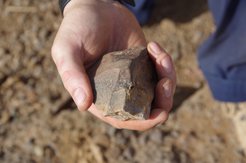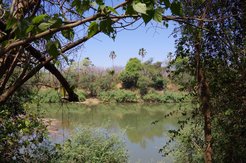
Eleanor Scerri to head Max Planck Lise Meitner Group on Pan African Evolution
Beginning December 1, 2018, Eleanor Scerri will be leading the first Lise Meitner Group at the Max Planck Institute for the Science of Human History, titled the “Pan African Evolution Research Group.” The group will use a suite of multidisciplinary projects and fieldwork programmes to study human evolution in Africa and southwest Asia.

The Max Planck Institute for the Science of Human History will host one of the first groups established under the Lise Meitner Excellence Program, headed by Eleanor Scerri. Major barriers to understanding the earliest chapters of human evolution in Africa include the dearth of research, and hence fossils and archaeology, from vast regions of the continent. As a result, there is still a very incomplete understanding of the patterns of mixing and expansion of early humans that are necessary to generate accurate inferences from a range of different data. The “Pan African Evolution” Group will address these problems through an ambitious program of multidisciplinary research including a large-scale fieldwork program generating new multidisciplinary data from a transect across West Africa, which is currently one of the least well understood regions of the continent for human evolution.
One of the major goals of this programme will be to recover human fossils and archaeology, new chronometric dates, and ancient DNA from this region. The group will also explore pan-African palaeobiogeography, including animal genetics, and engage with methodological development, in order to integrate very different sources of information. The program will also interlink with complementary projects at the institute and elsewhere. Doctoral and postdoctoral recruitment will begin in May 2019.

The Lise Meitner Excellence Programme is a new initiative from the Max Planck Society to recruit and promote exceptionally qualified female scientists. Successful candidates lead their own groups and have the chance of becoming a director at a Max Planck Institute in the future. The Lise Meitner Excellence Program is thus aimed at identifying up-and-coming scientists within a research field at an early stage in their scientific careers.
Eleanor Scerri is currently a Marie Skłodowska-Curie Actions Fellow at the Max Planck Institute for the Science of Human History. She was formerly a British Academy Fellow in Archaeological Science at the University of Oxford and a Fondation Fyssen Fellow at the University of Bordeaux. She has conducted fieldwork in North Africa and the Arabian Peninsula, as well as West Africa, and her research focuses on human evolution and changes in demography over the last half a million years in these regions.

